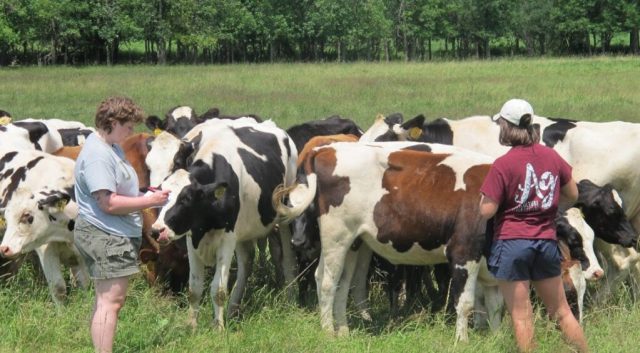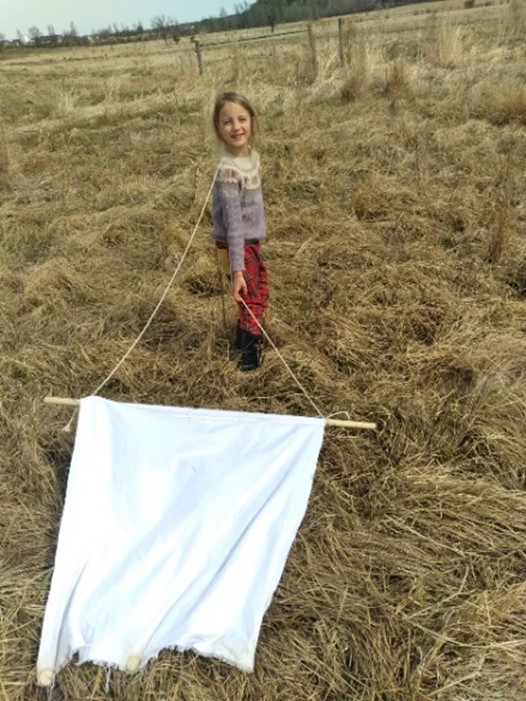By Bryony Sands
Spring has finally arrived! Cows are being turned out to pasture, and farmers are busy out in the field. This season is full of new life, but a familiar parasitic arachnid is once again putting a damper on things. Tick populations are becoming more active, and they are on the rise in the Northeast. Farmers are becoming more wary of ticks and the diseases that they carry, including bacteria, parasites, and viruses, which can affect livestock as well as themselves.
Tick-borne diseases have become a significant health concern for humans and livestock alike, and pastured cattle are at a high risk of exposure to ticks, increasing the risk to farmers as they work with them. Ticks have four lifecycle stages: egg, larvae, nymph, and adult. Each stage is active at a different time of the year, depending on the species. Many tick species live long lives and can survive for more than a year without feeding. They can also survive freezing temperatures and long, cold winters, becoming active whenever temperatures exceed around 40 degrees Fahrenheit.

In Vermont, the blacklegged tick (Ixodes scapularis) and American dog tick (Dermacentor variabilis) are common in pastures. These ticks take two years to complete their lifecycle. Adults become active in early spring as they quest for larger hosts such as livestock or humans. After they have taken a blood meal, the females drop off and lay up to 4000 eggs each, which hatch into larvae. Larvae seek out small hosts over the summer, such as rodents, or even reptiles and birds, and develop into nymphs between fall and the following spring. Nymphs quest for larger mammal hosts like raccoons or pet dogs and cats in the spring as they develop into adults. In the fall and following spring, adult ticks become active and quest for even larger hosts such as livestock, deer, or humans, resulting in the two main peaks in tick activity seen in spring and fall. Ticks must feed on blood at every stage of life to survive.
Vectors of Disease
The blacklegged tick transmits Lyme disease, which is the most common tick-borne disease in humans, and is caused by the bacterium Borrelia burgdorfei. Vermont has the highest reported rate of Lyme disease in the US. Cases have increased by 70% in the past 5 years. This increase in tick-borne illnesses can be attributed to multiple factors, but the main cause is climate change. Changing temperatures are delaying frost dates and expediting spring thaws, which is giving ticks more time to quest for hosts and hatch in ideal conditions. Tick-borne illnesses like Lyme disease are not just a threat in the spring and summer anymore because tick bites can happen all year round.
While Lyme disease can be devastating to human health, and prevention of bites from the blacklegged tick is a priority for farmers working in the field, it is not a disease that causes concern for livestock. For cattle, the black-legged tick is the most common vector of anaplasmosis, a bacteria in the genus Anaplasmosis that causes disease by entering red blood cells resulting in death and rupture of these infected cells. Calves typically do not show symptoms, but older cattle are more likely to succumb to the infection. Symptoms include anemia, jaundice, and weakness.

The American dog tick can transmit Rocky Mountain Spotted Fever to humans, which is an illness caused by infection with the bacterium Rickettsia rickettsii. Unlike Lyme disease, it can be spread from a female tick into her eggs, so the larval and nymphal stages are also capable of transmitting the disease. This tick is also a vector of Tularemia in humans (rabbit fever or deerfly fever), which is caused by infection with the bacterium Francisella tularensis, however this is rare. While the American dog tick is not a major cause of disease in our livestock, it can carry the pathogens that cause anaplasmosis and babesiosis. Bovine babesiosis, also known as tick fever or redwater in cattle, is a parasitic disease in cattle caused by protozoa in the genus Babesia.
A New Tick in Town
In our neighboring New York State, a new tick in town has been raising the stakes even further. The Asian Longhorned tick (Haemaphysalis longicornis) is an invasive pest native to East Asia. It has been present in the US since 2017, when it was found in New Jersey. Since then, it has been found in 21 states including Massachusetts and New York, but has not yet been found in Vermont. Asian Longhorned ticks pose a serious threat to cattle in the United States. Unlike other tick species, it is parthenogenetic, which means that a female can lay eggs by cloning herself to create the next generation without needing to find and mate with a male. Through this strategy, large populations can develop very quickly, and large infestations can occur on one animal. Although it has a wide range of hosts throughout its lifecycle, including mammals, birds, and reptiles, it preferentially infests cattle and can spread diseases that impact both animals and humans alike. The Asian Longhorned tick transmits the protozoan parasite Theileria orientalis to cattle, which is a pathogen that causes theileriosis. Symptoms are similar to anaplasmosis, including anemia, jaundice, and weakness. UVM Research to Evaluate Tick Risk in Cattle Pastures
Researchers with the University of Vermont Extension are conducting a study this summer to evaluate tick risk to farmers and livestock on grazed dairy and beef pastures across Vermont and New York. Extension assistant professor Bryony Sands is leading the project. She will visit farms every 2 weeks throughout the tick season to survey ticks and speak with farmers about tick presence. Sampling involves a dragging technique where a white flannel sheet is dragged over the vegetation along a transect, and ticks attach to the sheet because it mimics a passing animal. The ticks are then collected and brought back to the lab for identification. Farmers are collecting ticks directly from cattle, themselves, and workers on the farm for the project. All ticks will be sent for molecular analysis to identify which diseases they are carrying. The project aims to provide valuable information to farmers about the risk to themselves and their livestock from ticks, and will collect data on how vegetation structure, pasture management, and grazing strategies might influence tick transmission. Ultimately the data will help to identify strategies to minimize the risk from ticks and tick-borne diseases on our farms.

The research is in collaboration with NYS IPM at Cornell University, with Kenneth Wise (Associate Director of Agricultural IPM) and Joellen Lampman (IPM and tick specialist) working on the project in New York State. Twenty farms are participating in the study, and tick surveying is well under way. So far, the blacklegged tick and American dog tick have been found in abundance on Vermont farms. In addition to these two species, the Asian Longhorned tick has also been found at two farm sites in New York State.
This work is supported by the National Institute of Food and Agriculture, Crop Protection and Pest Management, Applied Research and Development Program support (award number 2024-03411)
Any opinions, findings, conclusions, or recommendations expressed in this publication are those of the author(s) and should not be construed to represent any official USDA or U.S. Government determination or policy.




















You must be logged in to post a comment.